Wayne Gretzky's greatest season probably isn't the one you think it is

Were it possible to hold a séance and conjure up the ghost of a carnival barker who delighted in trying to dazzle you with barely believable figures, that individual would look to get his hands on the Wayne Gretzky stat book. You can do some real crazy things with Gretzky-based math, at both the micro and macro level, and still be telling the truth.
Let me drop a micro-level one on you: in 1985-86, when Gretzky scored his career high of 215 points, he scored in 78 out of 80 games.
That’s actually true. I’d like to say I’m making that up—even I don’t especially believe myself there—but there it is, something you couldn’t even do in squirts. Here’s one for the macro-level: Gretzky won three scoring titles after leaving Edmonton. More than you’d think, right? Guess who how the highest scoring season in the 1990s? You want to say Mario Lemieux, don’t you? But it would be Gretzky, with 163 in 1990-91, for which he did not receive the Hart trophy as MVP. That went to Brett Hull. Shouldn’t have, though, but sometimes you get sick of giving the hardware to the same person, year after year.
‘It changed my life:’ Wayne Gretzky on the first time he met Gordie Howe
Gretzky buffs are like Mozart and Sherlock Holmes buffs. They like to cite stats, weird-but-true facts—truths, in the case of the great detective, if you prefer, but call it mind-expanding bits of info all the same. Mozart wrote this symphony in this short amount of time, Holmes deduced this because of a pat of butter, Gretzky scored his 1000 point in his 424th game. You get the idea. And one of the most popular Gretzky topics is which year was his best.
Pretty much everyone focuses on three campaigns: 1981-82, when he exploded into global stardom well beyond hockey and atom-bombed the record book with 92 goals and 212 points. Then there was the aforementioned 215 point campaign. After that, we have ’83-’84, when Gretzky was on pace to score more points than ever, ending up with 205 in 74 games, and scored in 51 in a row.
Had I to pick from the three, I’d go with ’83-’84, but being allowed any selection at all, I’d go with what Gretzky did thirty years ago, in 1986-87. He didn’t top 200 points, as he did on four other occasions, finishing with 183. After “only” scoring 52 goals the season before, he led the league in that category again with 62—as if he wished to prove that he still could, if properly motivated, and not trying to average two assists a game, as he just had. But let’s go inside the scoring numbers that year, and also do something that we must do with Gretzky’s career, which we often fail to do, being so bewitched by the singular math of his achievements.
Seven players had 100 points that year. But normally when someone would finish second to Gretzky, they’d do so with more than 130 or 140 points. Sometimes a group of players would be all bunched up like that.
This, after all, was the high-flying 1980s, before there were defensive layers, and teams packing it in. Call it Pony Express hockey, a mad dash of mad dashes, dudes racing up the ice, dudes racing the other way on the counterattack, with head shots being thrown, guys coming out of their skates in blatant attempts to injure—you didn’t need 20/10 vision to see it—and stick fouls that must have left most players picking splinters out of their midsections after the game.
In short, it was kind of glorious, and YouTube will attest that. Lose yourself in some clips. But: that season, the No. 2 man, Gretzky’s triggerman linemate Jari Kurri, finished second with 108 points. That’s two more than Patrick Kane had last season, in a league where no one will get 100 this season, you are an ungodly sniper if you score 40 goals, and a point-per-game average makes you a modern day Mario Lemieux. Or Peter Stastny, at least.
Wayne Gretzky: Off the Ice
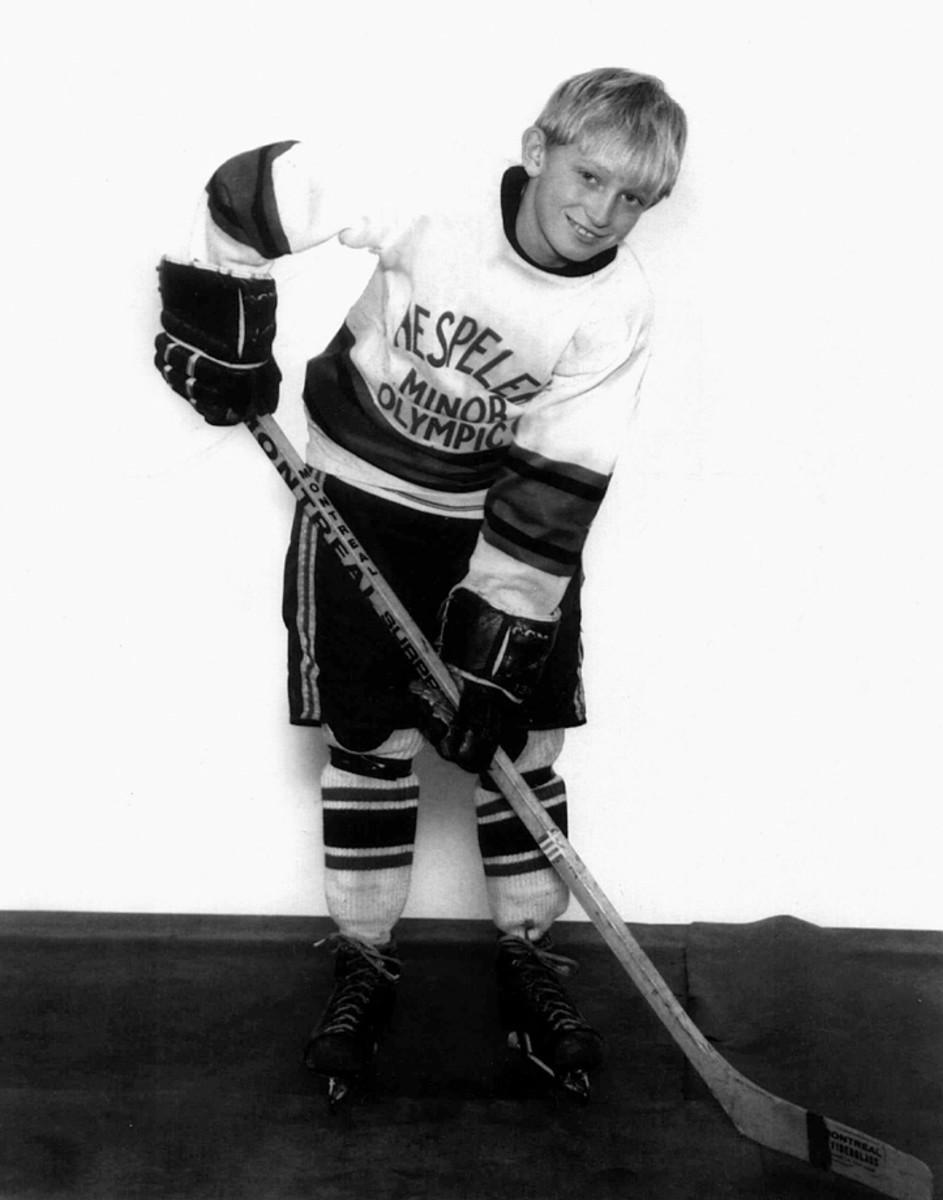
At age nine, Wayne Gretzky was a youth hockey phenomenon in Canada. As he progressed quickly from level to level and dominated against much older players, some newspapers called him "the next Bobby Orr" for his speed and skill.
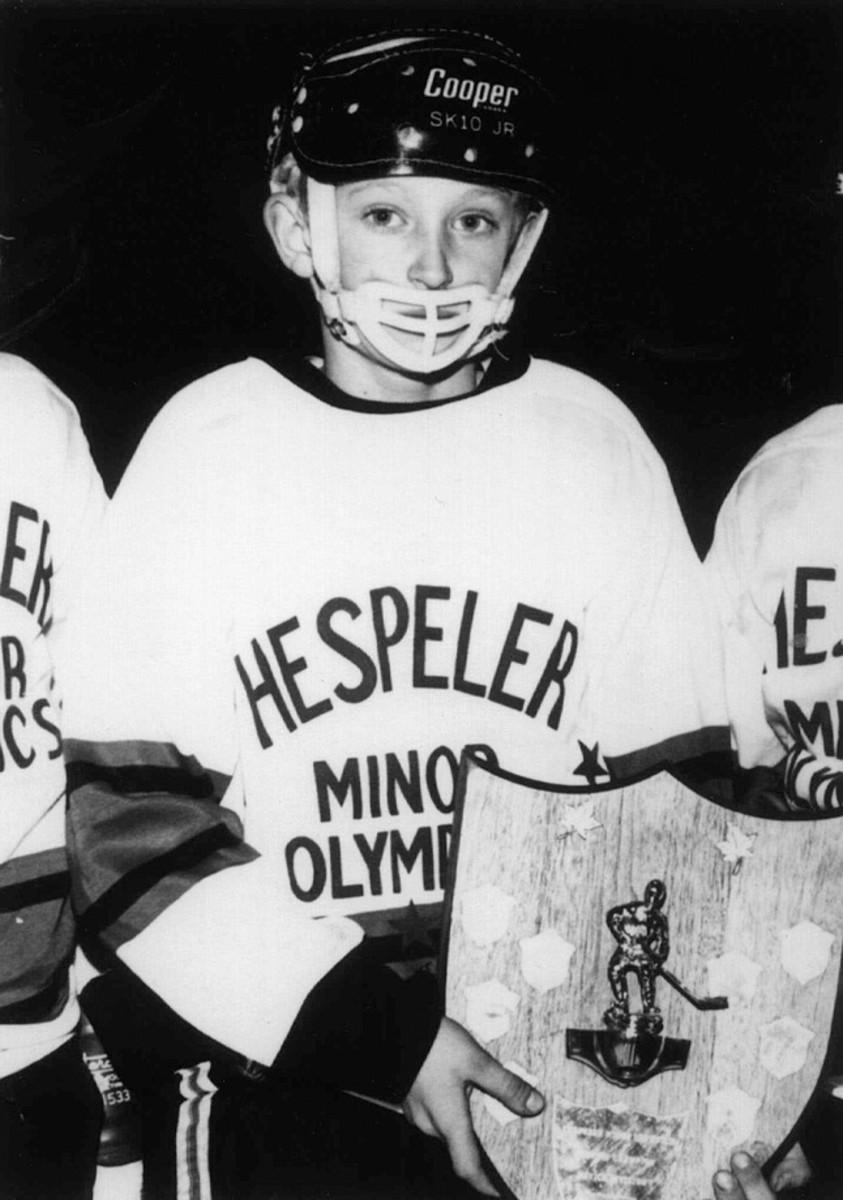
The future Great One laced up his first pair of skates and spent countless hours on a rink built by his father in the backyard of their home in Brantford, Ontario. By the age of five, Wayne was competing against kids who were 10 or 11 years old.

At age 11, Gretzky was running wild in his Pee Wee league in Brantford. Nicknamed "The White Tornado" for his white gloves and speed, he scored 378 goals ... in one season. In one Pee Wee league game, Gretzky potted three goals in 45 seconds. "He would never come off the ice," recalls Darren Eliot, who played against Gretzky in the same league. "He moved to defense instead of actually taking a break on the bench."
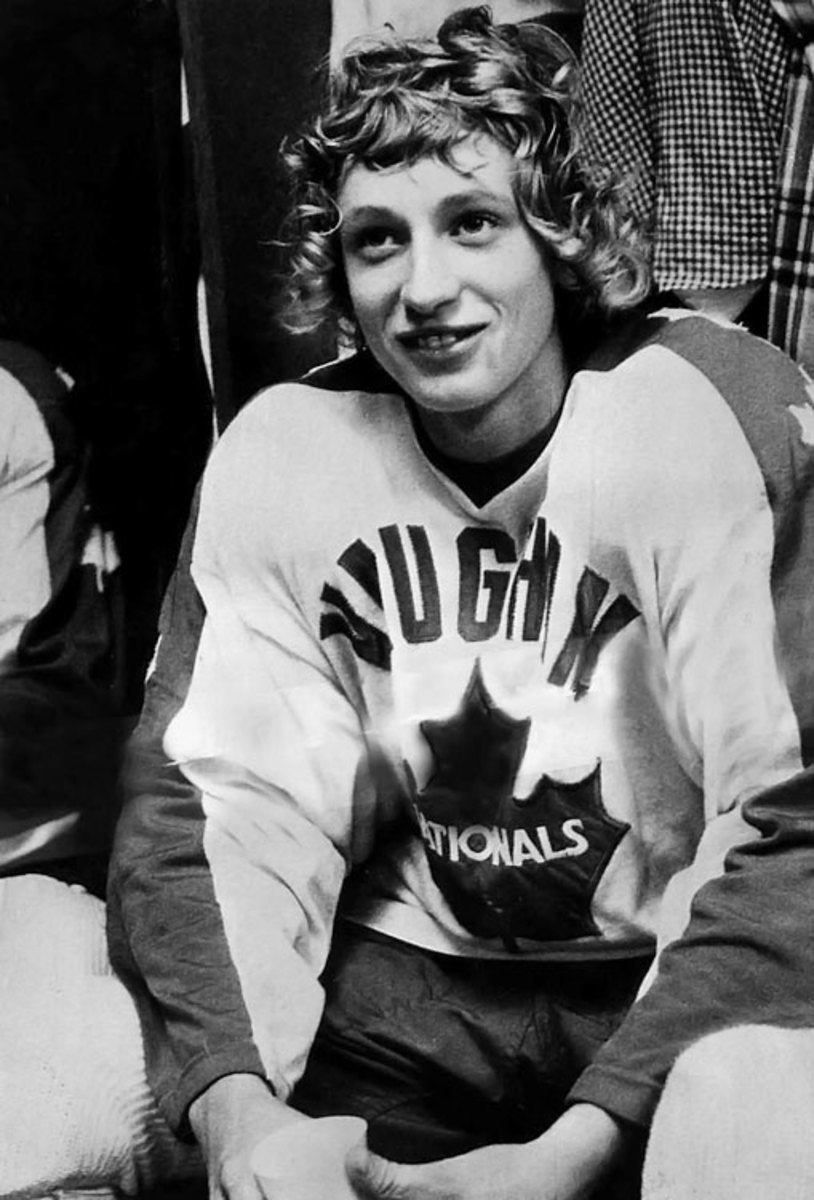
By age 14, the curly-topped phenom was a target of resentful parents in Brantford, some of whom cheered when he was injured during a game, so he moved to Toronto to play minor hockey for the Nationals.
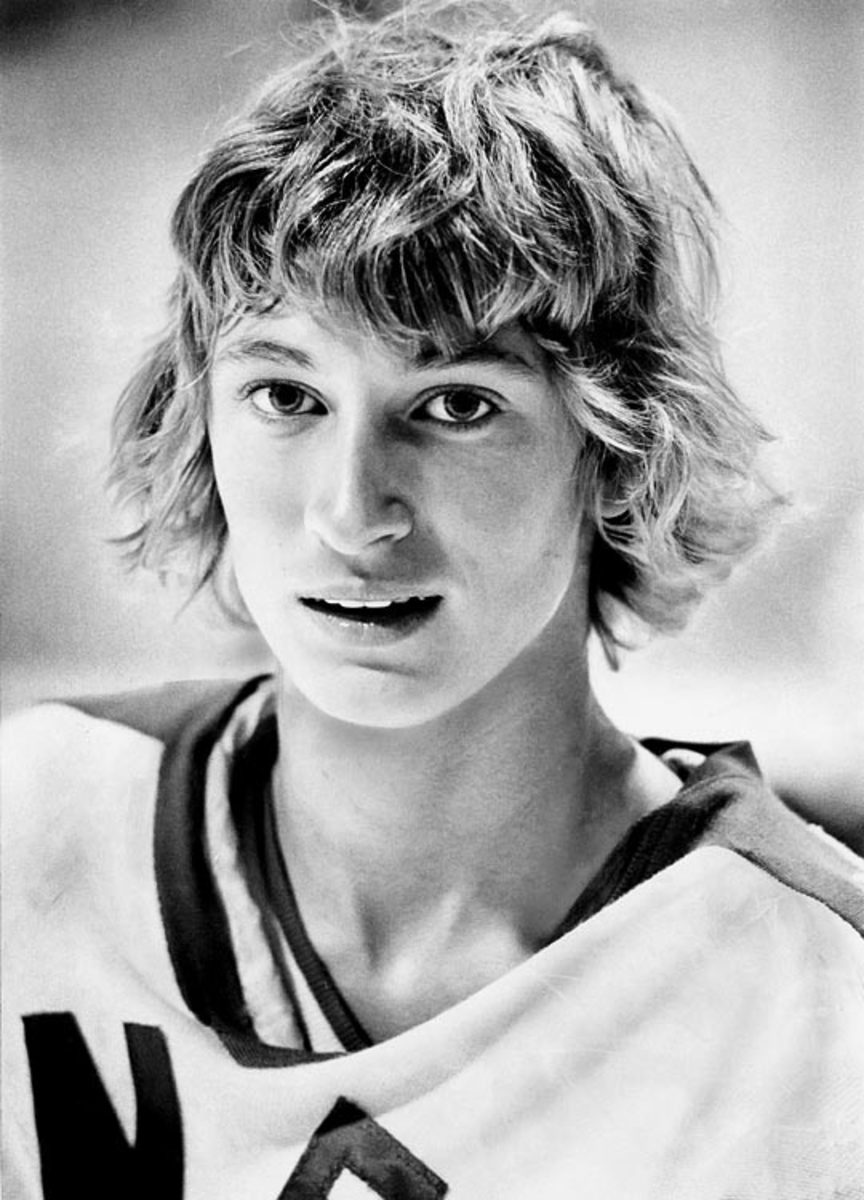
Gretzky, 17, scored 70 goals and 182 points in 63 games for the Sault Ste. Marie Greyhounds of the Junior A Ontario Hockey Association and was the youngest player on Team Canada at the 1978 World Junior Championship in Quebec City. (He lead all scorers with eight goals and nine assists in six games.) Despite his prowess and uncanny on-ice sense and vision, some scouts feared he would be too small to play in the NHL.

Gretzky lived with a local family while he played in Sault St. Marie, Ontario. Here, the 17-year-old enjoys a neighborhood game of street hockey.

Gretzky throws a check, something rarely seen in his professional days, during a game of street hockey.
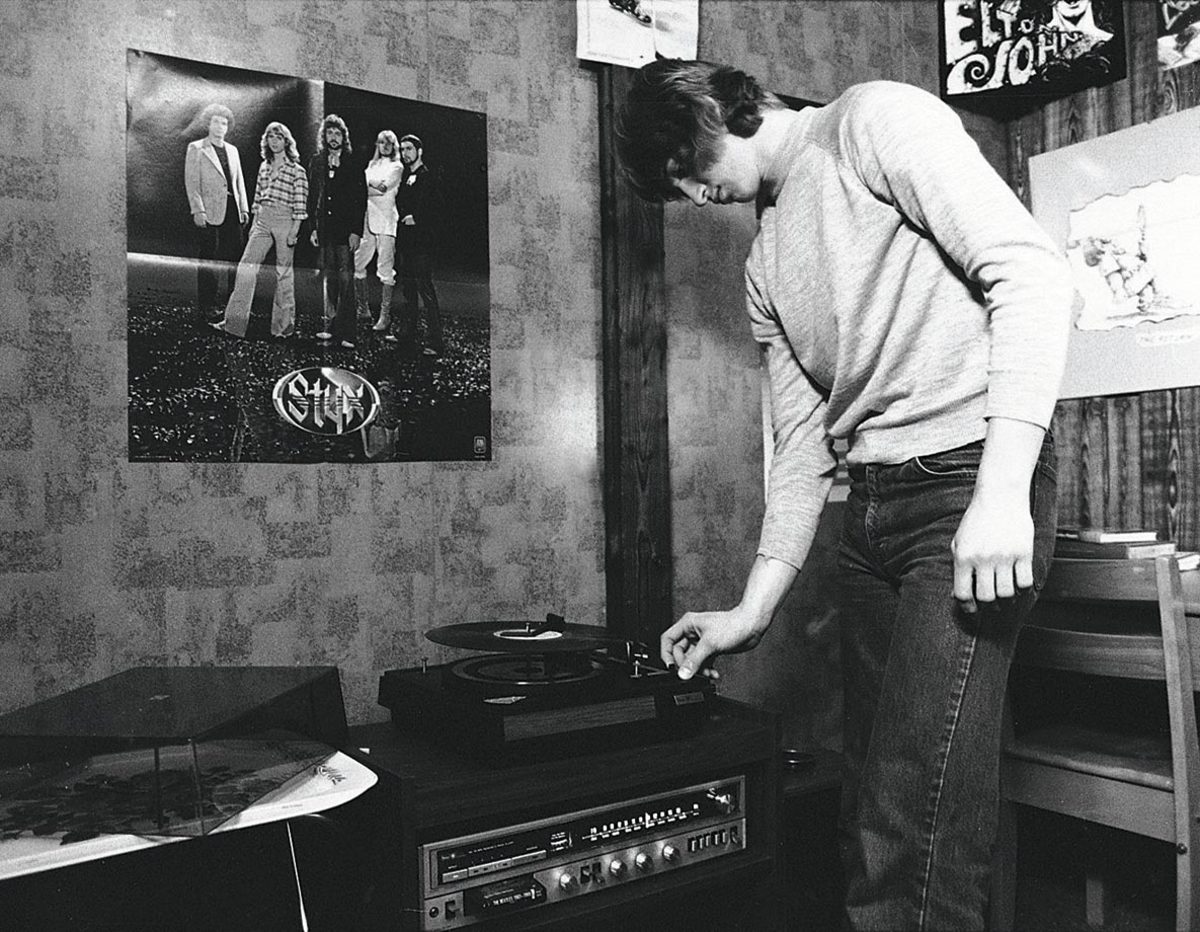
Obviously partial to the progressive sounds of Styx, the 17-year-old Gretzky spun some hot wax on his stereo in the Bodner family's house in Sault Ste. Marie.
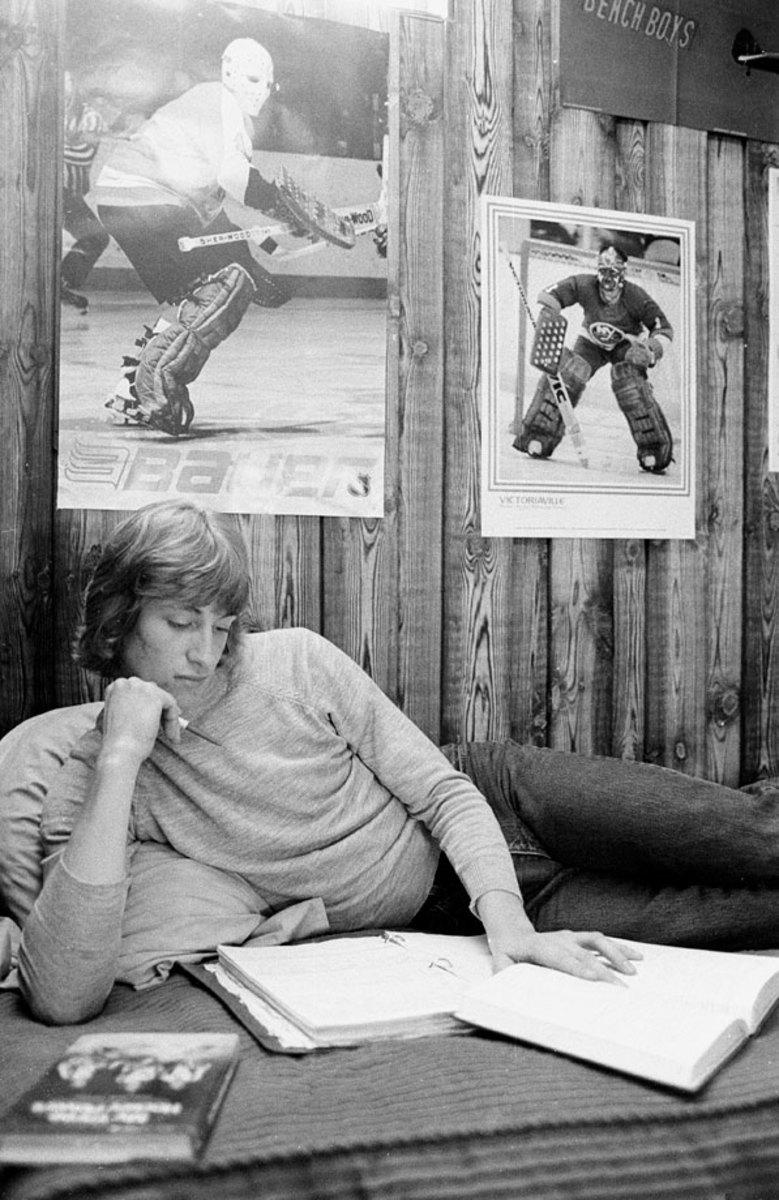
The teen phenom, seen here in his room at the Bodner family's house in Sault Ste. Marie, tried to keep up with his schoolwork as a pro career loomed.
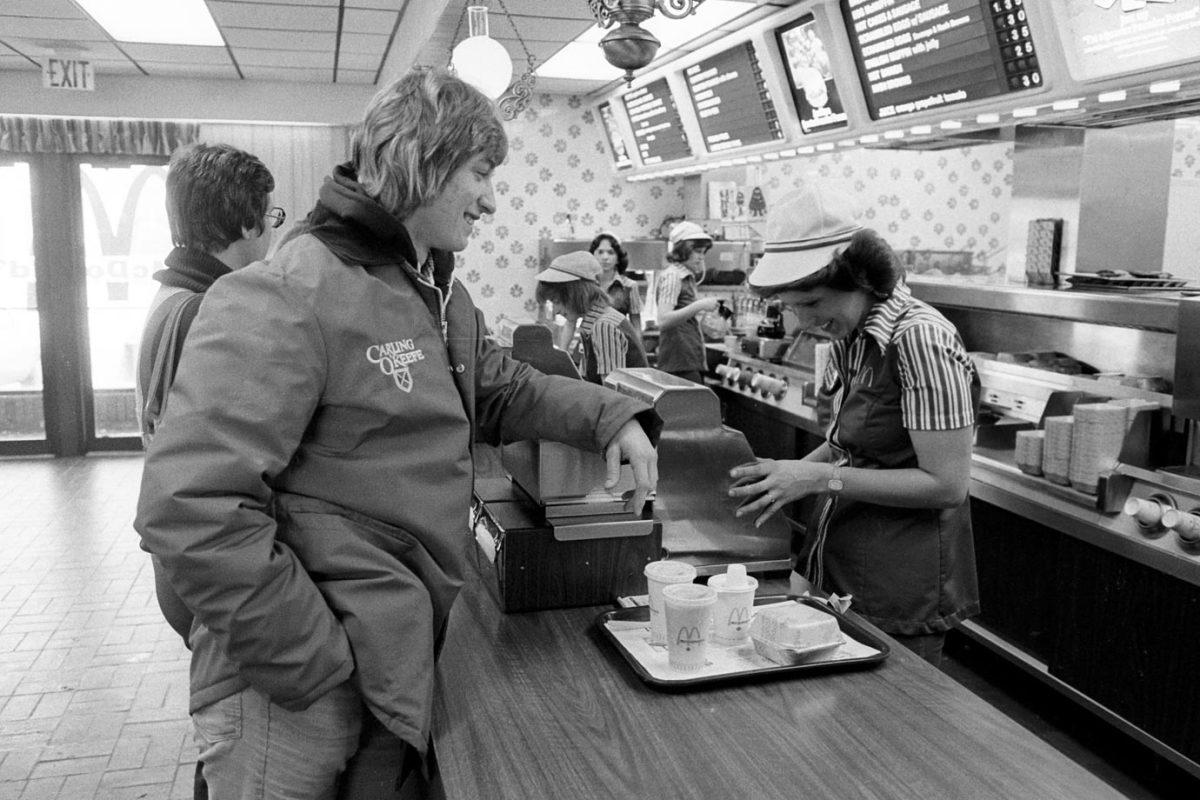
The future Great One grabs some grub at a McDonald's in Sault Ste. Marie.
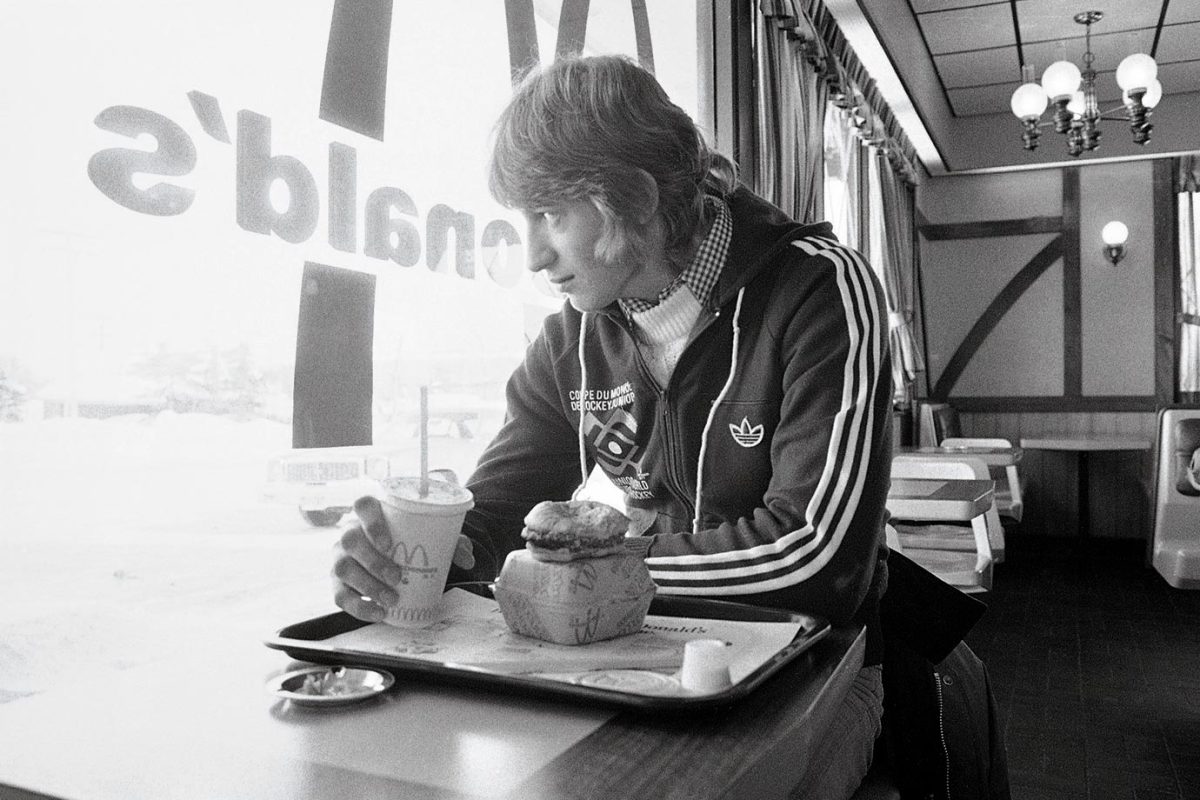
Gretzky would go on to sponsor numerous businesses in his pro days, including McDonald's.
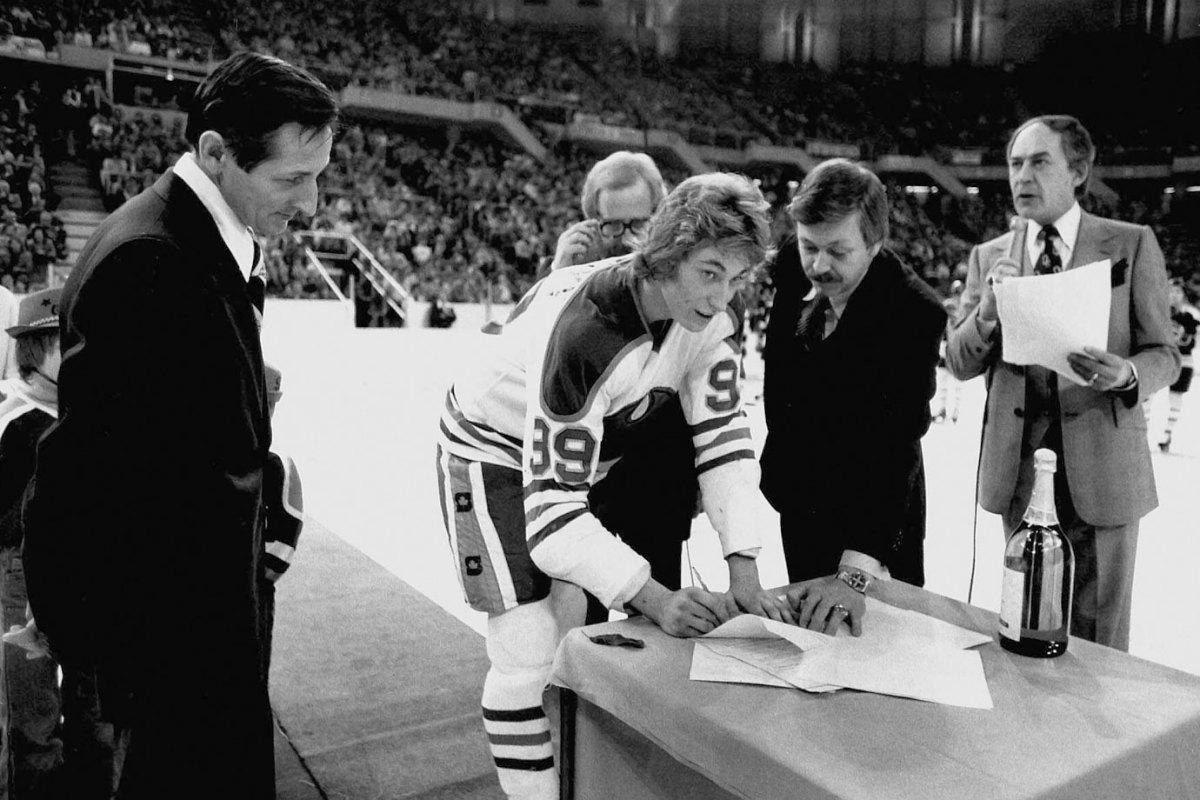
Gretzky had played only eight games for Indianapolis when the team folded. He was sold to the WHA's Edmonton Oilers, with whom he signed a 21-year contract worth $1 million per season on his 18th birthday. The Oilers were absorbed by the NHL later that year and Gretzky's accomplishments and legend would reach unprecedented heights.
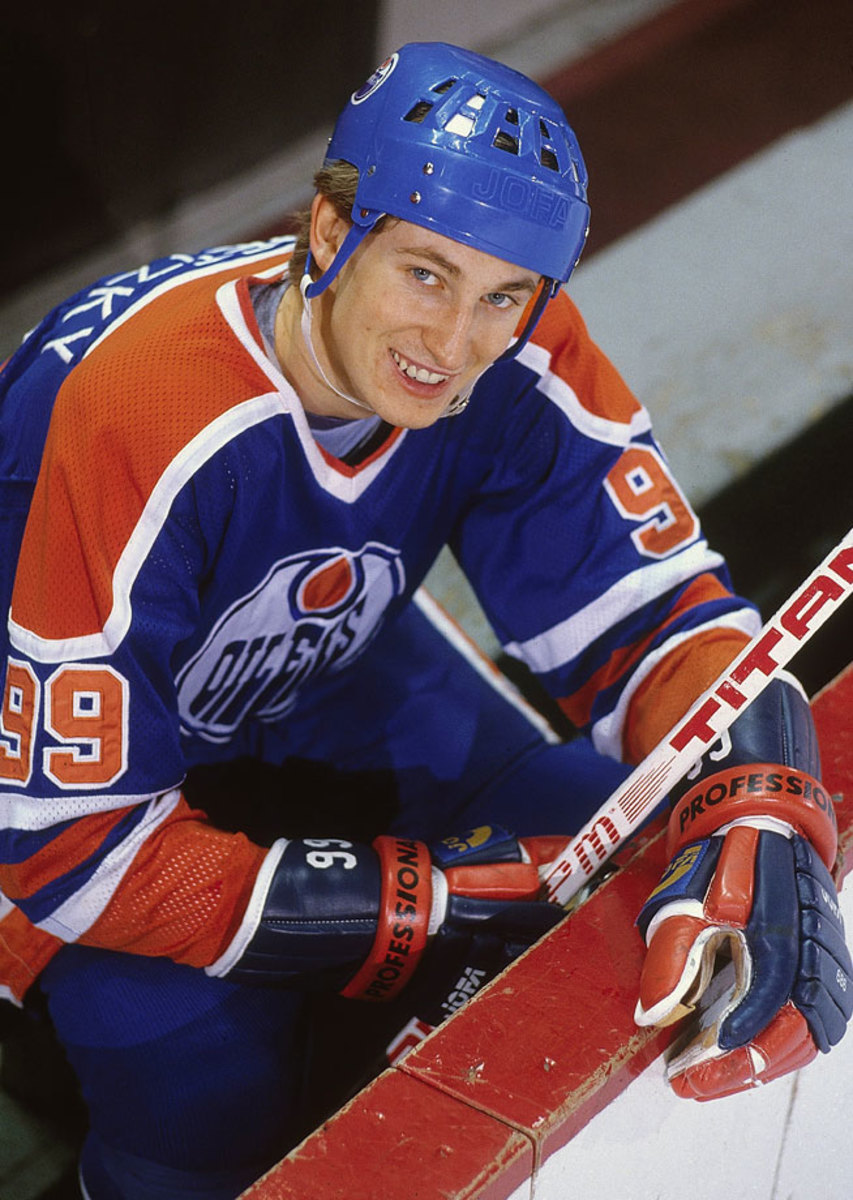
Gretzky had good reason to smile before the playoffs in '81. He would go on to score 21 points (7 goals and 14 assists) in just nine games that postseason, before the Oilers were eliminated by the defending Stanley Cup champion New York Islanders in the second round.
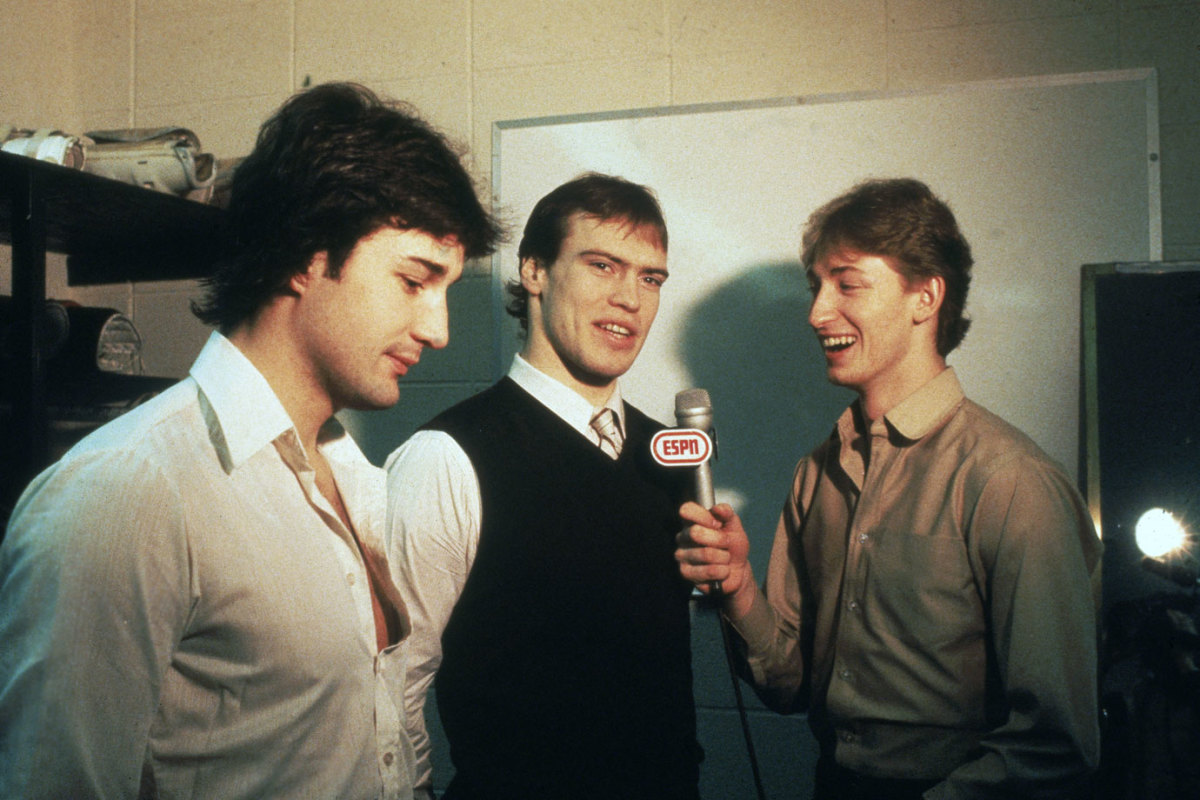
Gretzky and the Oilers quickly became a force. Here, he playfully interviews two of his most notable teammates -- future Hall of Famers Paul Coffey and Mark Messier.
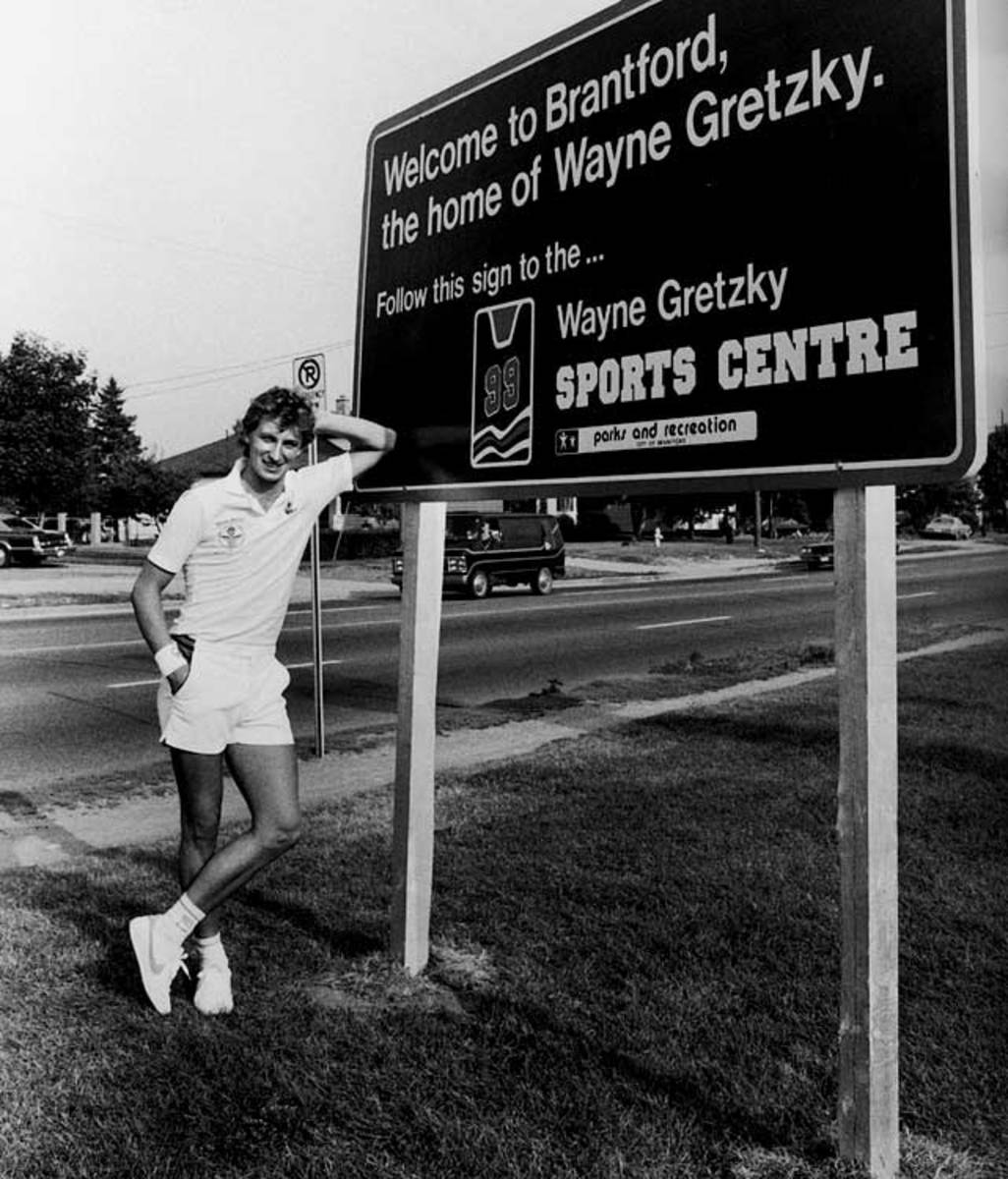
Only four years into his pro career, Gretzky had put his hometown on the map.
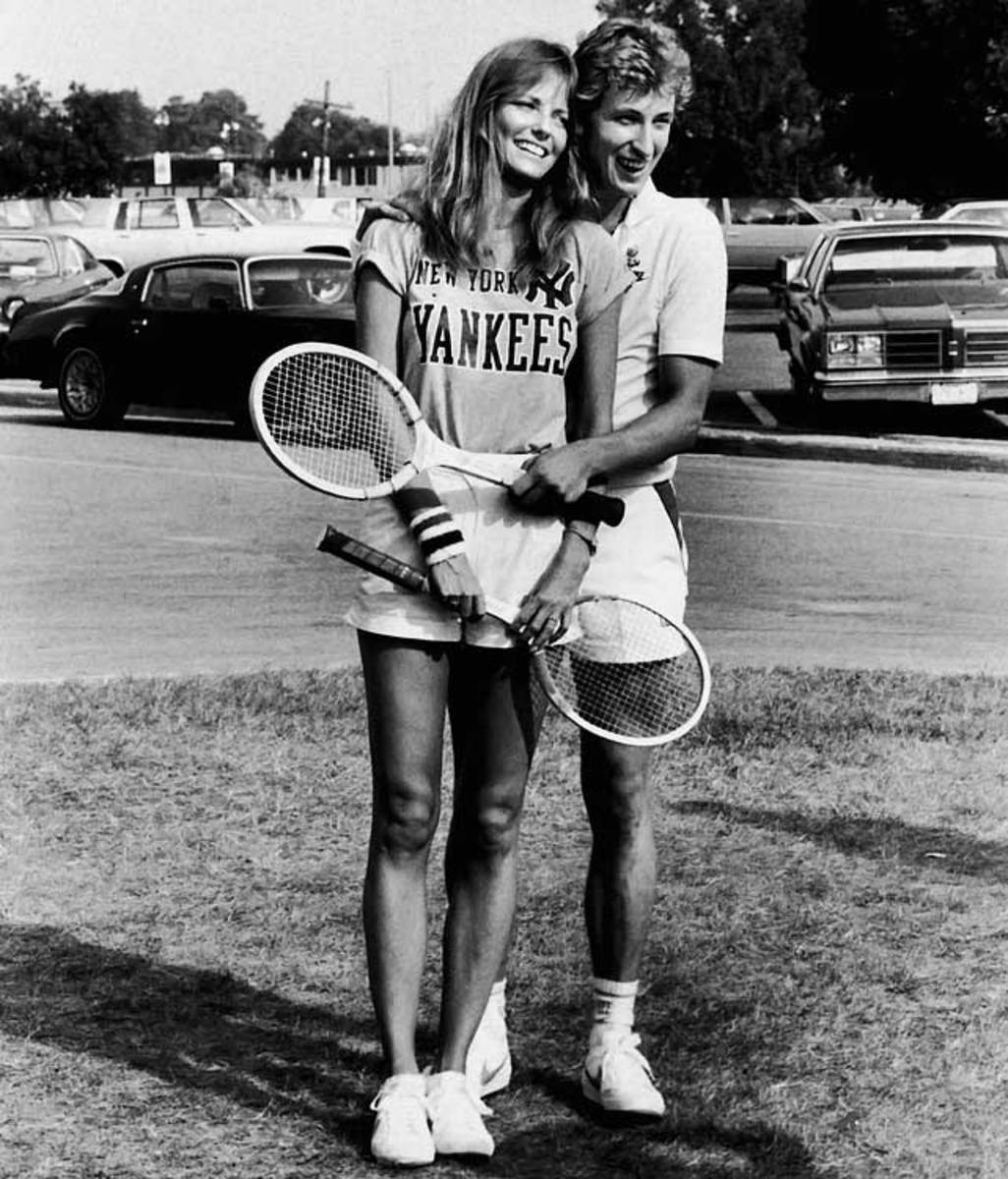
One of the perks of fame is you get to hobnob with models. Here, Gretzky schmoozes with Cheryl Tiegs during his charity tennis tournament.
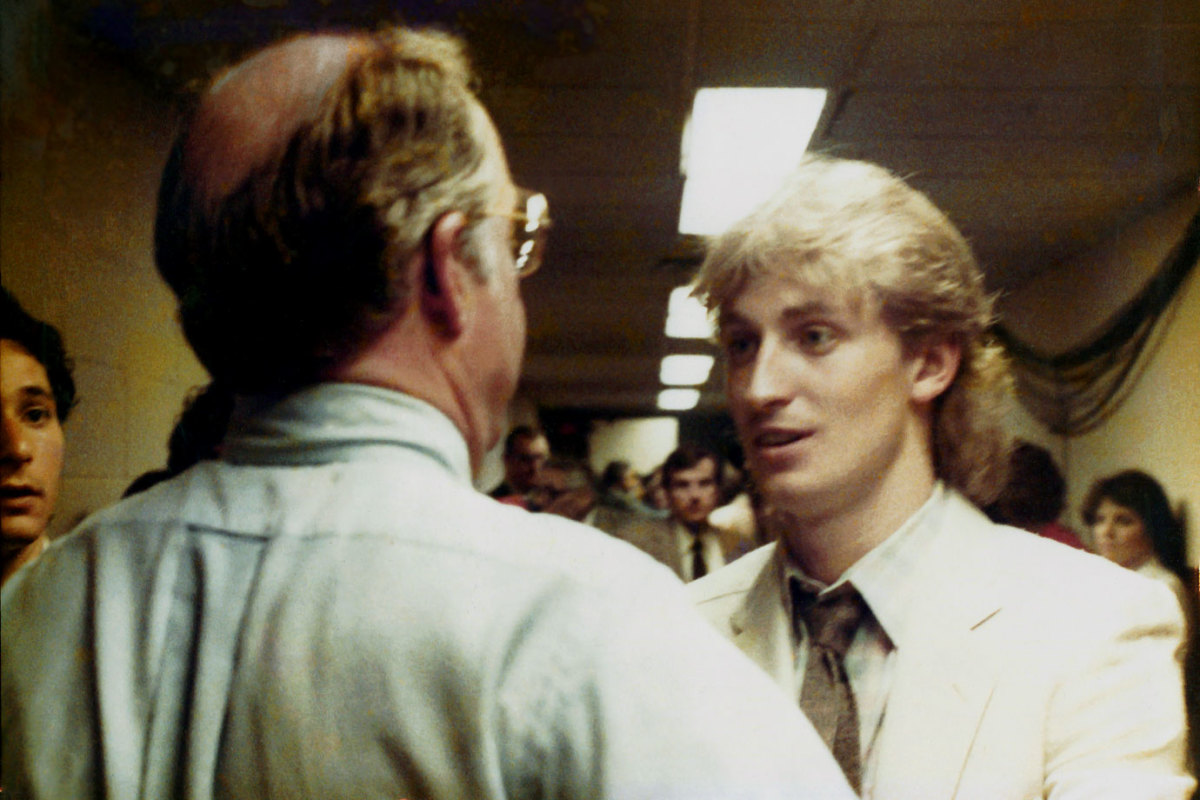
The Oilers reached their first Stanley Cup Final in 1983, only to be swept by the four-time defending champion New York Islanders. Gretzky congratulated Islanders GM Bill Torrey, who told him, "Don't worry, kid. You'll be back next year." Torrey was right. In 1984, Gretzky and the Oilers dethroned the Isles in five games.
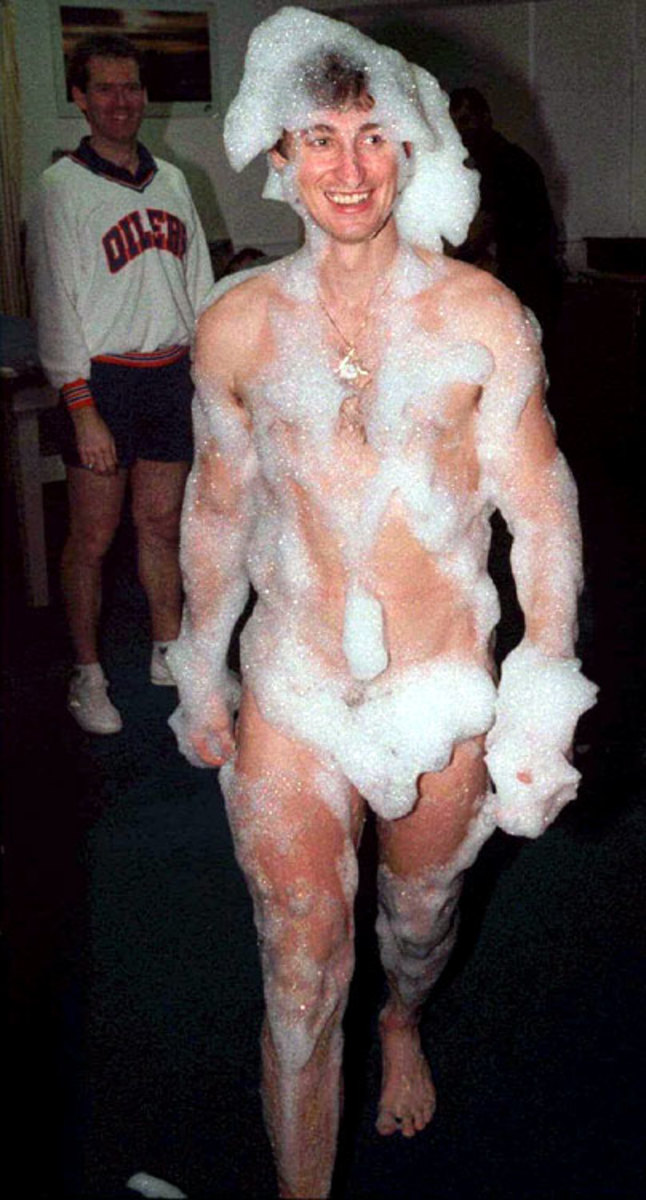
Mr Bubble: The Great One parades through the Oilers' dressing room. By that time, he was routinely shattering scoring marks and his Oilers were becoming a dynasty that would win four Stanley Cups in five years.

Gretzky married actress Janet Jones on July 16, 1988 in a ceremony that was tantamount to a Royal Wedding.
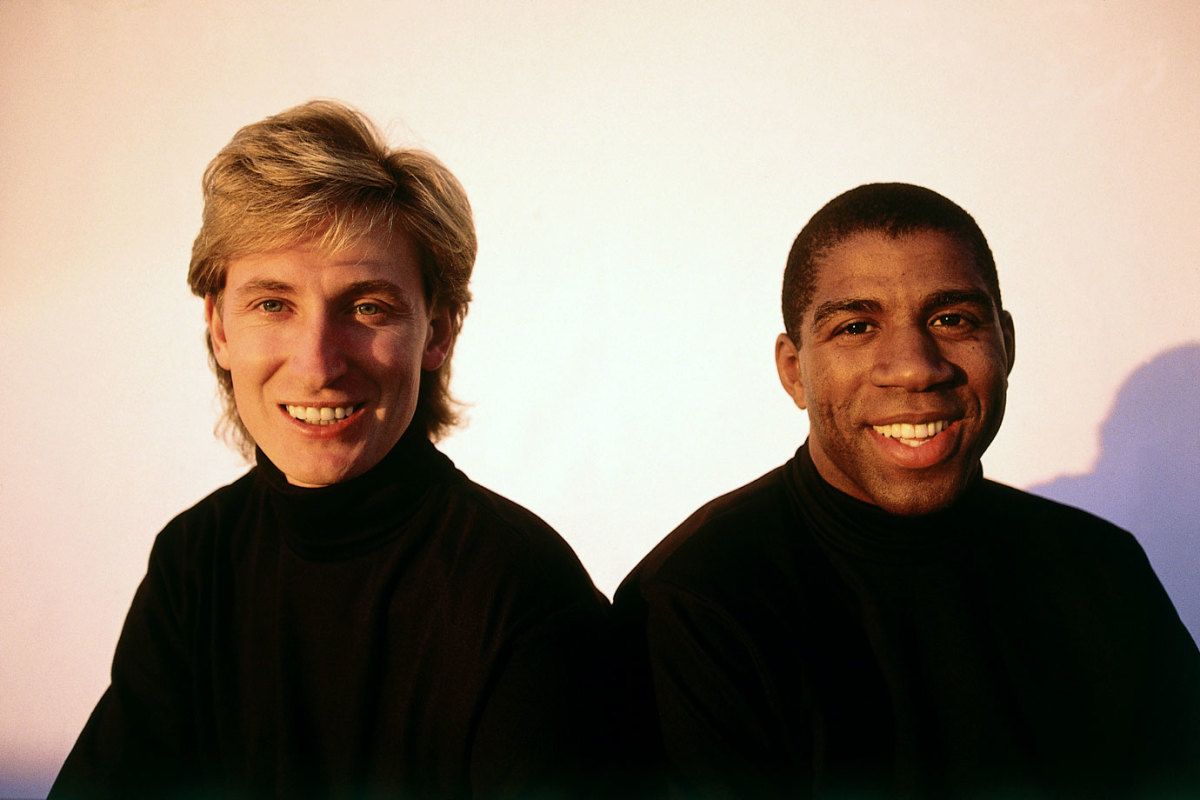
Gretzky's trade from the Oilers to the Los Angeles Kings in August 1988 was a landmark event for hockey in the United States. The Great One was welcomed to L.A. by Lakers superstar Magic Johnson.

Wayne Gretzky holds his four-year-old daughter, Paulina, after a press conference in Inglewood, Calif., on Jan. 4, 1993. It was announced that the Los Angeles Kings team doctors cleared Gretzky, who hadn't played all season due to a herniated thoracic disk in his back, to return to the game.
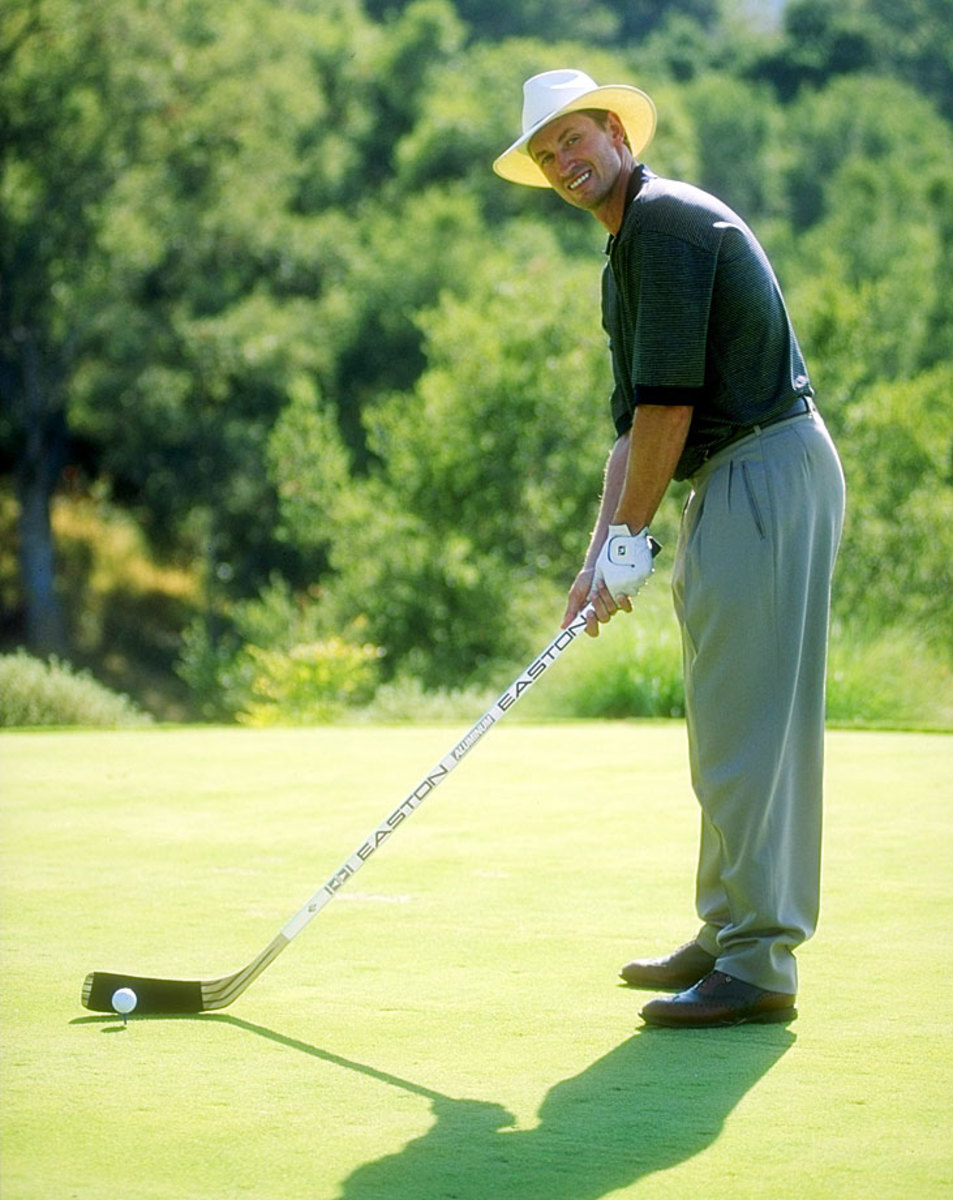
Gretzky lines up a shot during a golfing event in 1994, using a club he's more familiar with.
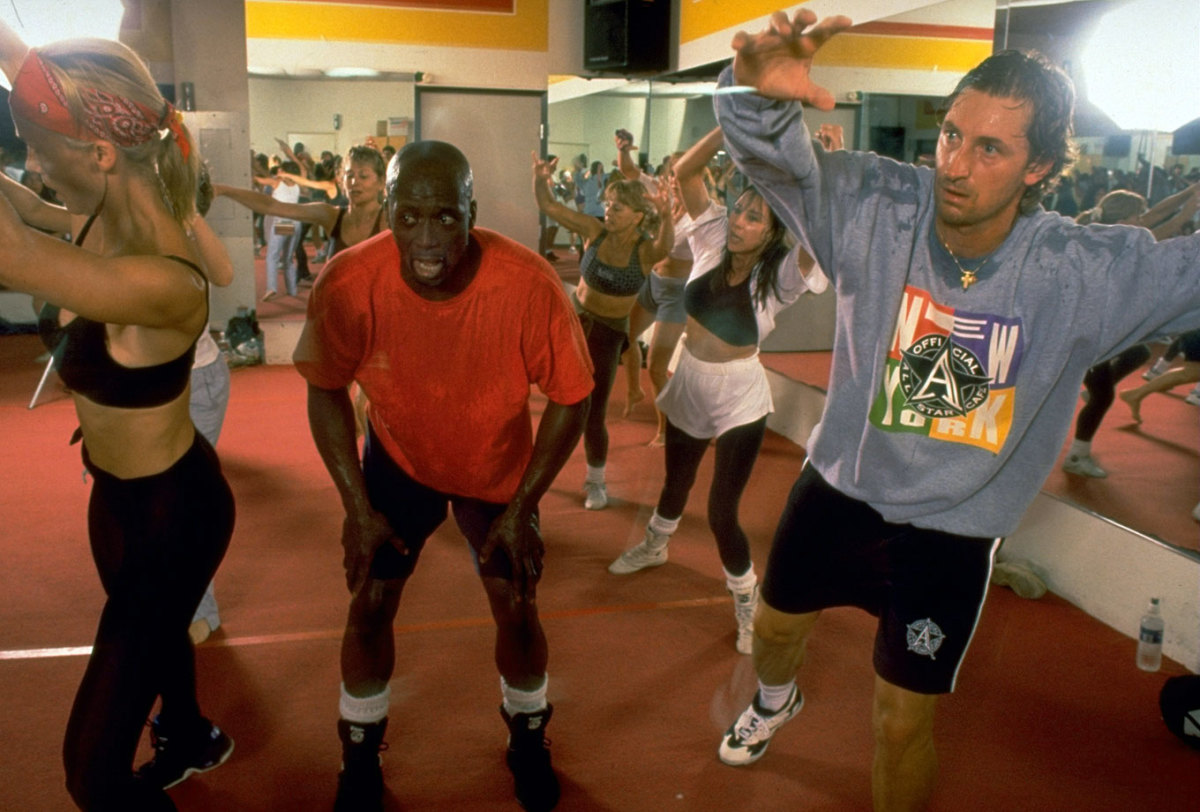
Wayne Gretzky breaks quite the sweat in an aerobics class taught by Billy Blanks in 1995.
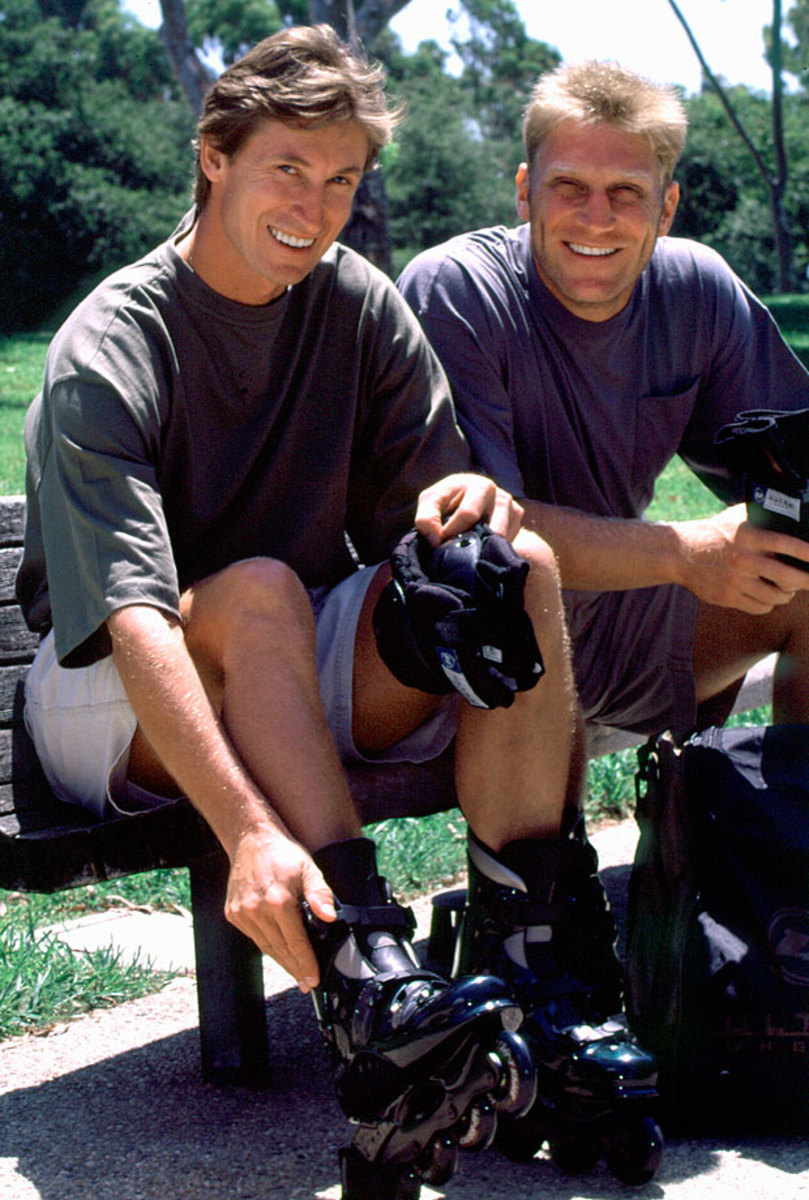
Gretzky and Brett Hull gear up with inline hockey skates in Los Angeles following the 1995-96 NHL season.
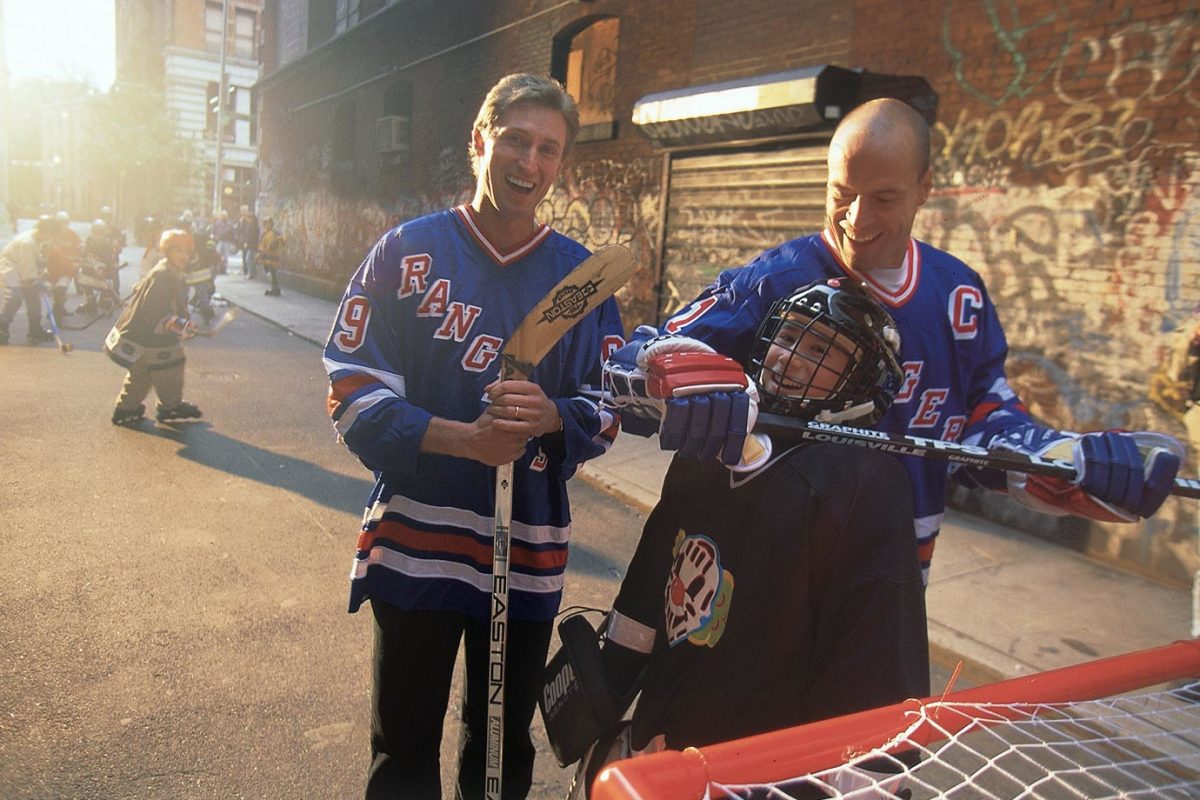
By 1996, Gretzky had moved on to the New York Rangers after a brief stay with St. Louis, reuniting him with former Oiler teammate Mark Messier.
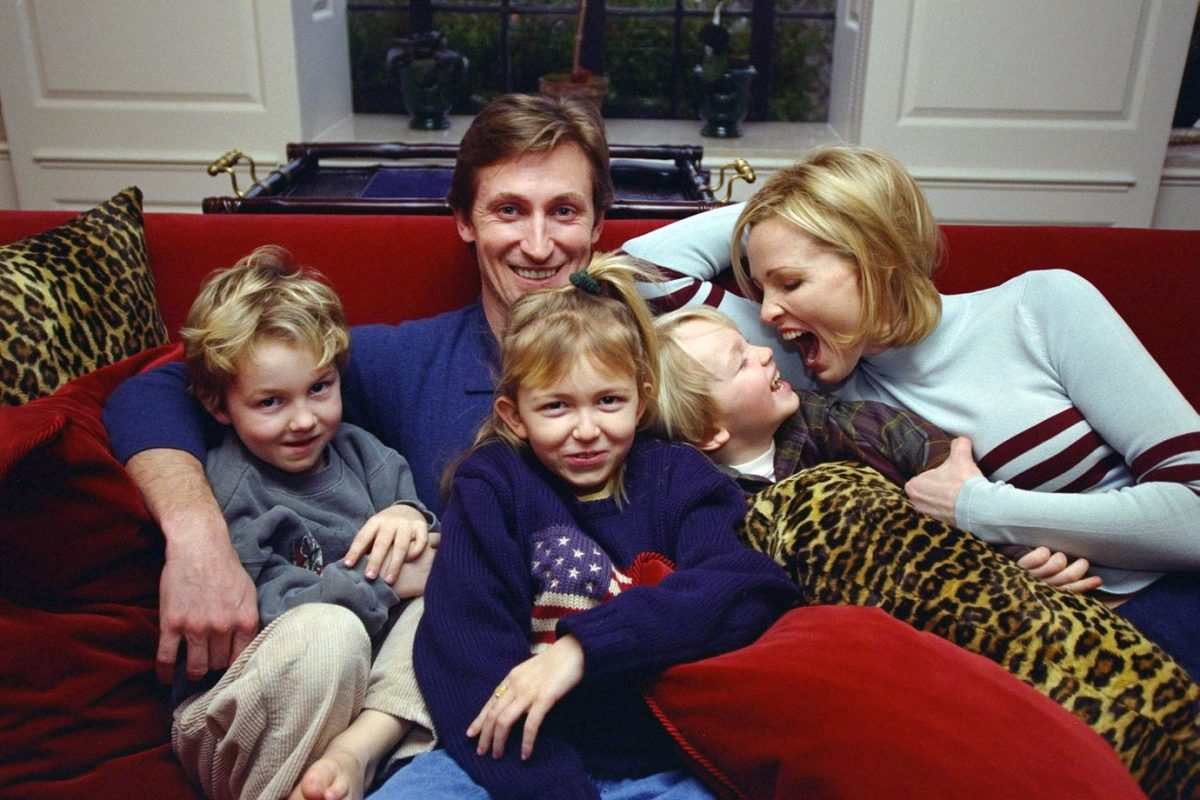
Wayne Gretzky sits with his family, wife Janet and their kids Trevor, Paulina and Ty in 1997.
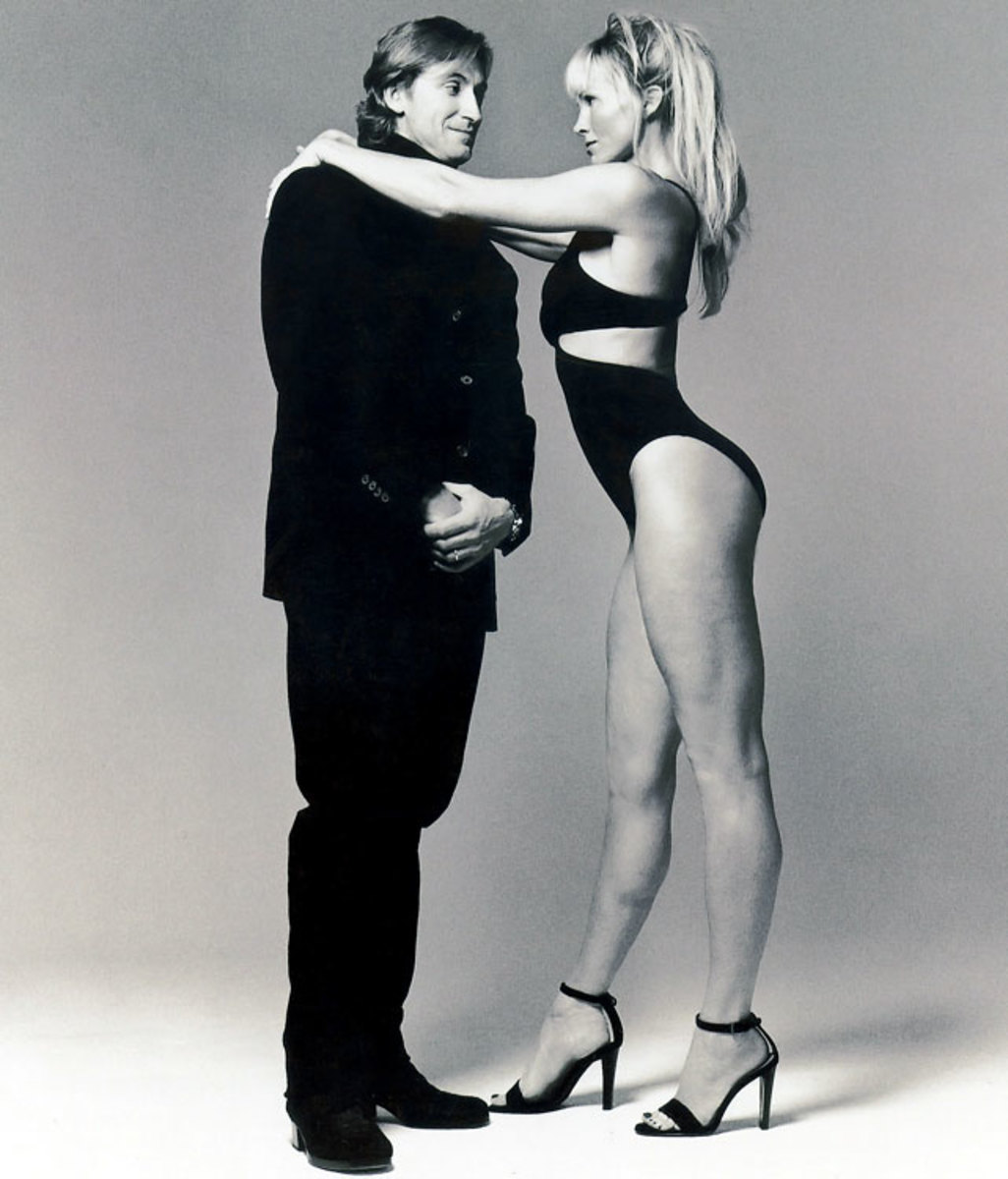
The Great One and his wife Janet graced the 1998 Sports Illustrated swimsuit issue.
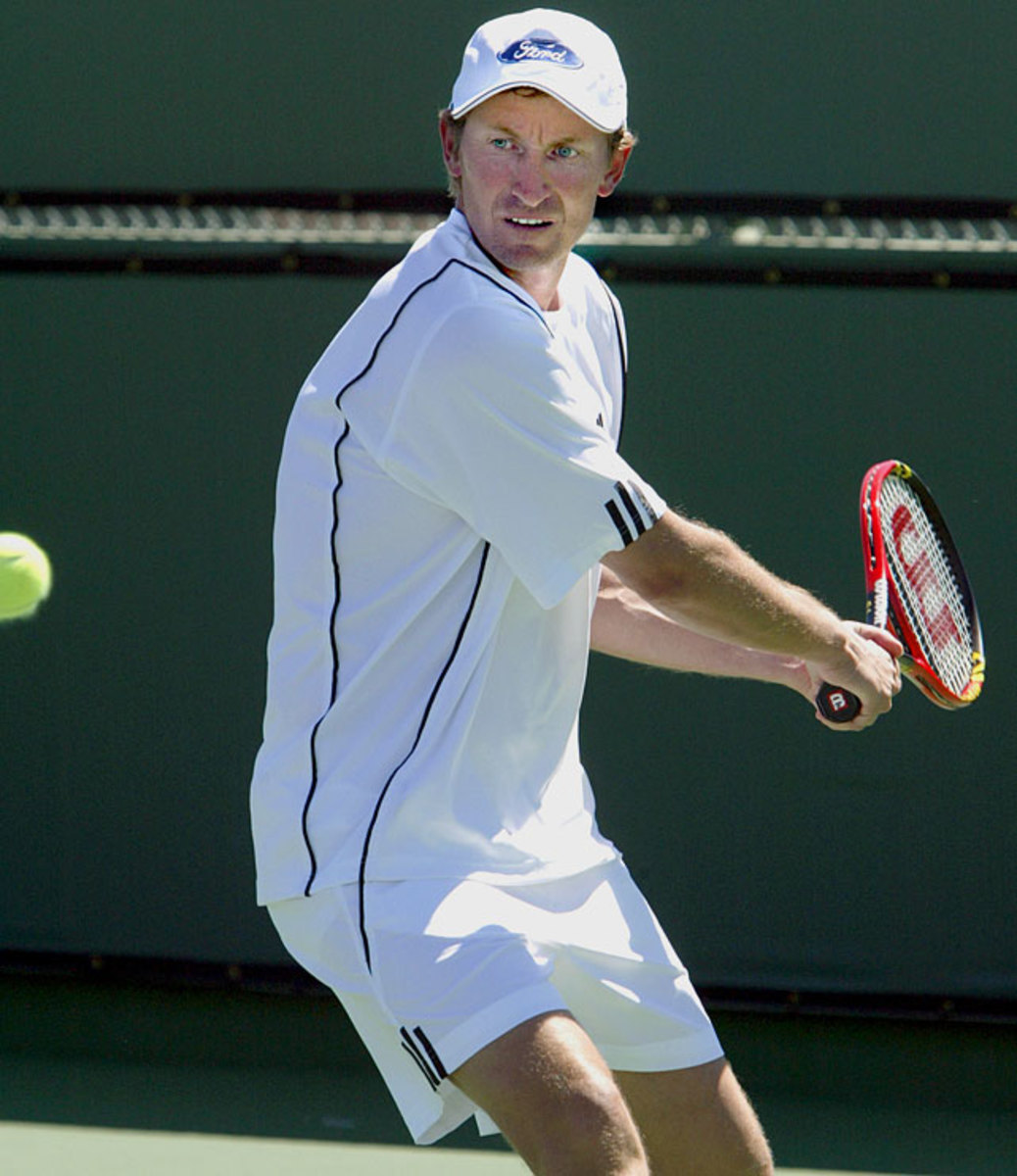
Gretzky readies a backhand swing at Indian Wells during the Pro Am Tournament to Benefit the Prostate Cancer Foundation in 2004.
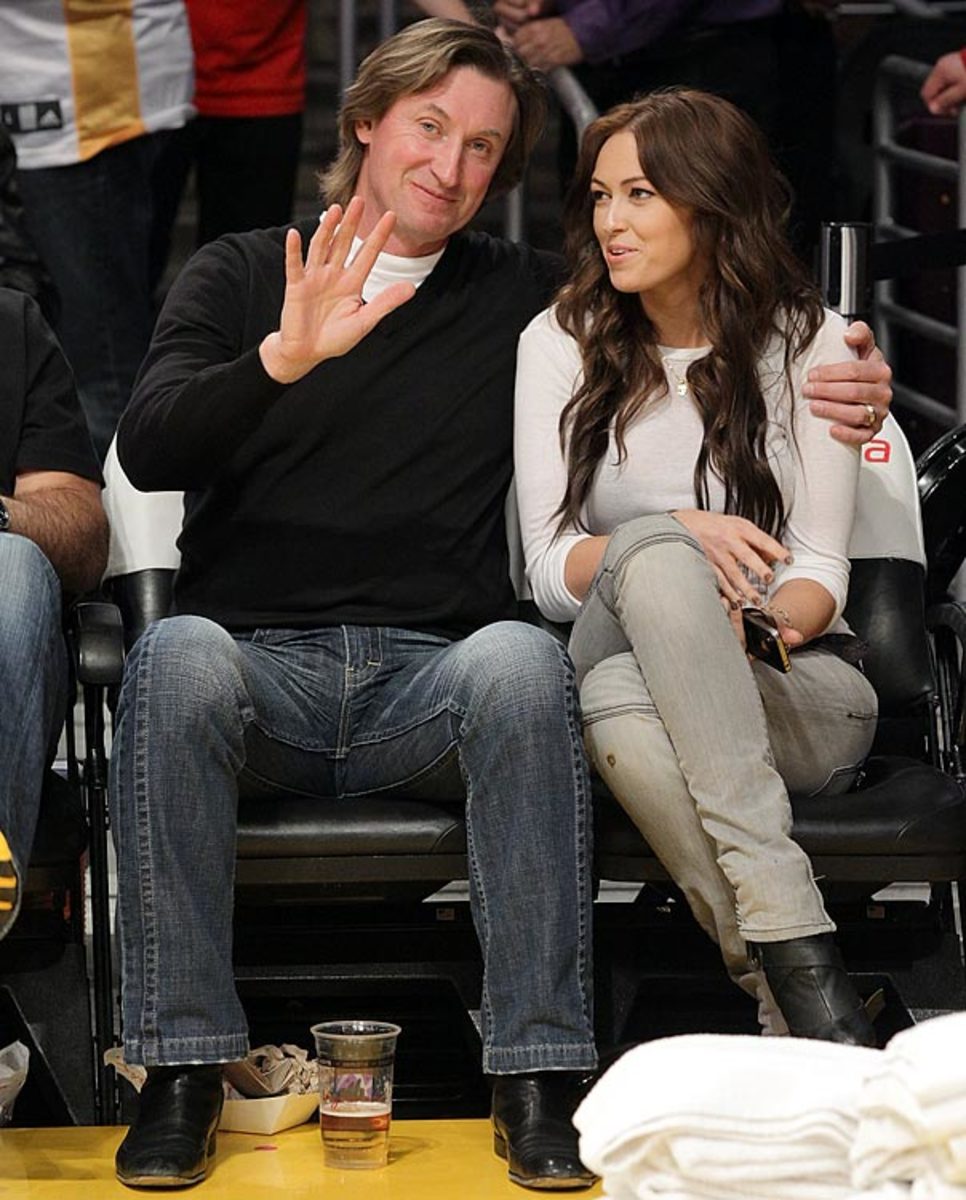
Gretzky and his daughter Paulina attend a Lakers game against the Jazz at Staples Center in 2011.
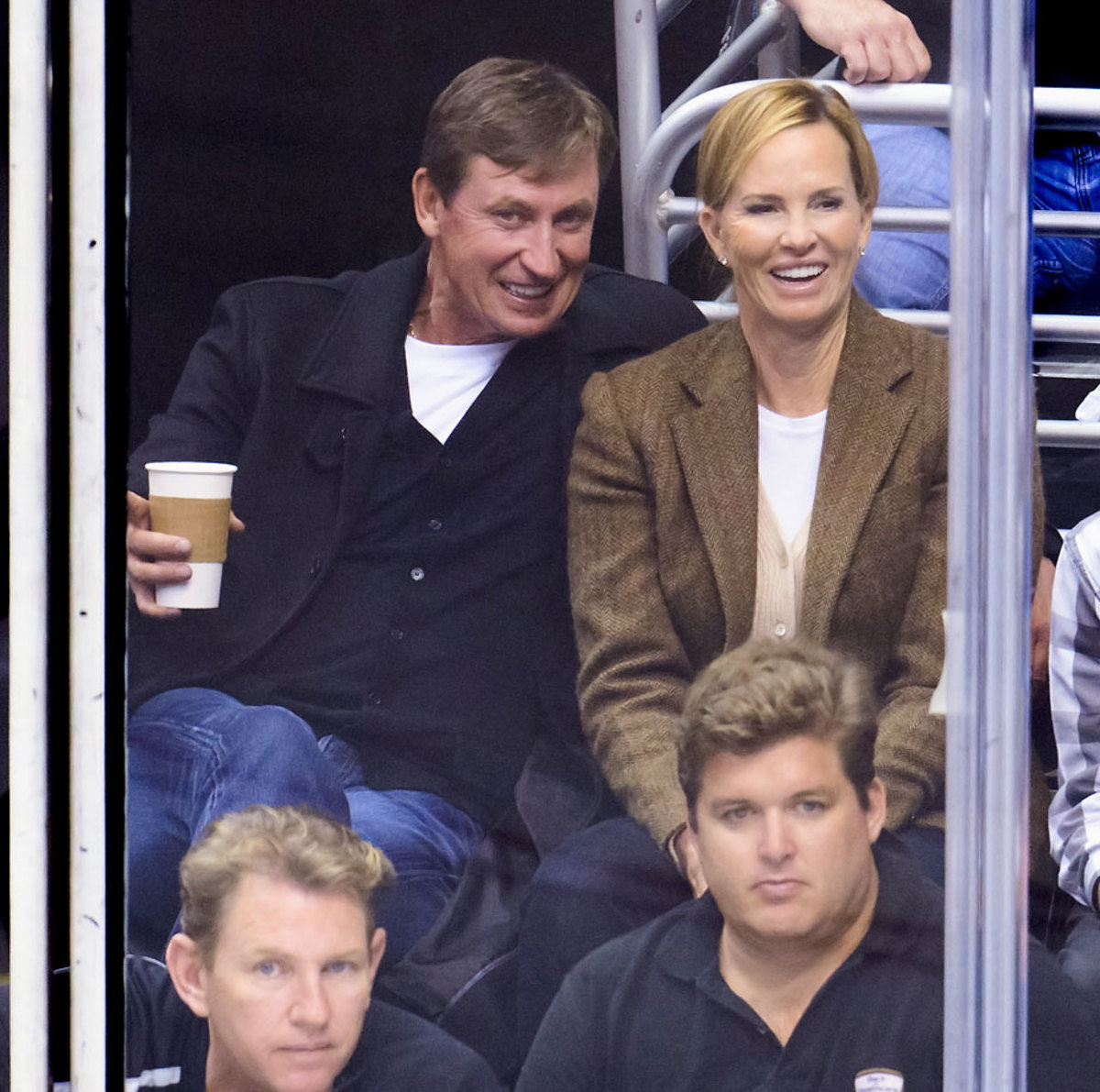
Wayne and Janet take in a Kings game against the Blues at Staples Center in 2013.

Pro golfer Dustin Johnson looks up to his future father-in-law, Wayne Gretzky, during a photo shoot in Los Angeles on Jan. 9, 2015. In “The Great One,” Johnson has a father figure who can teach him a thing or two about handling fame.
True, Lemieux had 107 points and missed almost twenty games, but what does it tell you if you outpoint your linemate, the scoring runner-up, by almost 80 points? Some differences, in math, mean more than other differences. Gretzky had years where he’d lead the league by comparable margins, but those other players he was besting were excelling more, and here in 1986-87, we see them excelling less, because, presumably, conditions have become less favorable for them to do so.
Everyone was impacted—save, of course, Gretzky. He basically did what he did in, say, 1982-83, a sub-200 point year sandwiched around years he went over the double century mark.
People like to argue that Gretzky would get killed in today’s league. Mirth-inducing. The rules would have favored him—you can’t so much as lay out your laundry, let alone a guy with his head down—and a Gretzky without a redline for two-line offsides would have always been behind the D, or sending someone who had been off on yet another merry breakaway.
But let’s look at this a different way, away form the numbers. Gretzky is still ascending in his career at this time thirty years ago. His finest hockey awaits him: that will occur in the fall of 1987, at the Canada Cup. I’m going to say that no one has ever played hockey close to as well as Gretzky did in that three-game final against the Soviets. Part of the reason was that he controlled the game more, exuded his dimensionality with greater range into every last cranny of the rink, picked more spots that had greater meaning. Whereas, before, a 9-3 blowout and a 2-2 third period edge-of-your-seater were handled indiscriminately. Shifts without points carried greater heft, set tones, set up forthcoming shifts. Forthcoming games. Forthcoming series, too.
Gretzky offers context, insight into his legend with "99: Stories of the Game"
The points dipped a touch, but everyone else’s dipped a lot, even all-world guys like a Kurri. Mark Messier had 107, which was a good number for Mess, and he also had a game that transitioned well to different iterations of how the game was being played, from era to era or just year to year. Offensive blueliner Paul Coffey missed a lot of games, which is probably where Gretzky’s 200-point season went. But if Coffey had been there? He might have buried that 215 mark.
Gretzky, by the way, had 121 assists that year, even though his stud teammates weren’t doing quite what they had been doing for the bulk of that decade. So he was spreading it around more. Naturally, you see that assist total, and you’ve probably just had the epiphany, if you haven’t been trying to come to grips with one like it for years, that Gretzky didn’t need any of those 62 goals, and he still would have led the league in scoring by 13 points with a big fat zero in the goal column. Our Mr. Carnival Barker man wouldn’t even bother with that stat, because he’d know you’d take him for a huckster and go somewhere else, even if he was saying the Gretzky-laden truth.
